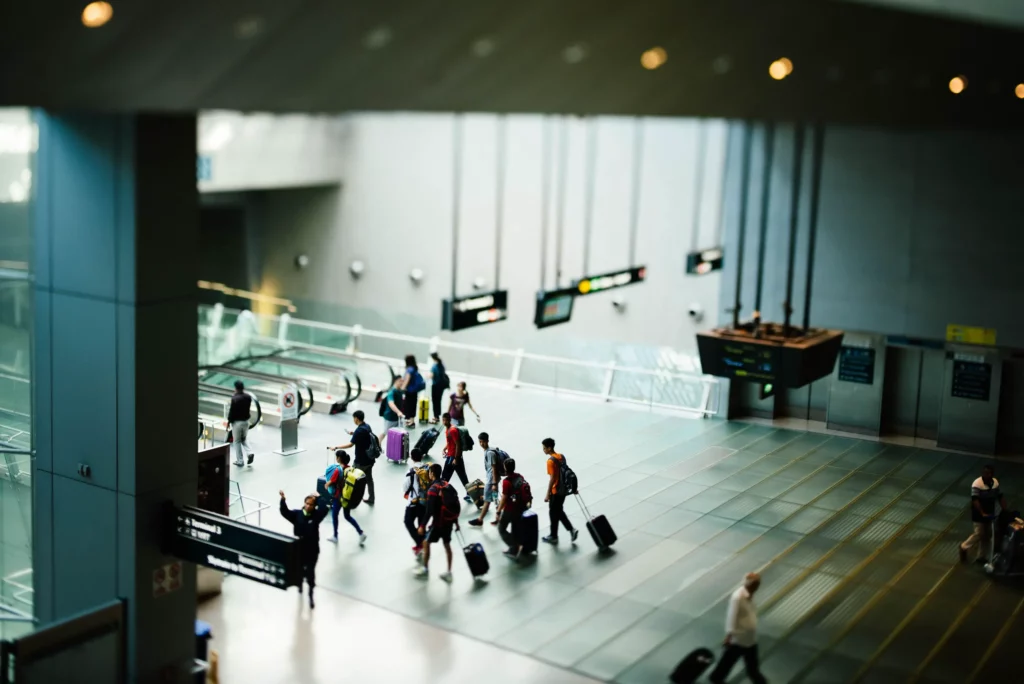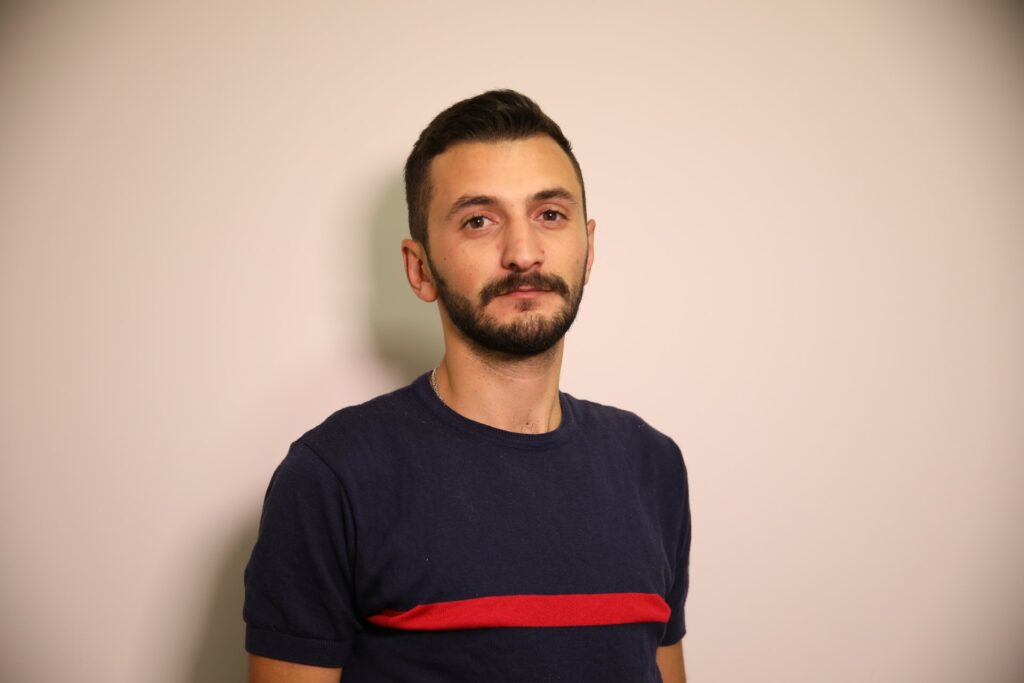by Albert Serobyan
The house where Sergey (name changed) was born is in a state of war. The 30-year-old recounts how his ancestral home, constructed by his grandfather, bore the scars of three Nagorno-Karabakh wars with cannon dust on its walls. Now both home and war feel distant as Azerbaijan’s army entered the city of Hadrut in Nagorno-Karabakh in October 2020. For three years now, the homes of Sergey, his childhood friends, and all their relatives have remained under occupation.

SERGEY BALAYAN | REFUGEE FROM NAGORNO-KARABAKH
When the war started I was in Hadrut, at home with my parents and family. We heard the sounds of artillery, and soon learned about soldiers being deployed to their positions in urgency. Later, news broadcasts confirmed Azerbaijan’s attack. We hoped it would be brief, but within days, we had to flee our city. We went to Yerevan to stay with our relatives. After Hadrut’s occupation in November the idea of returning to Artsakh became senseless. Our stay in Yerevan lasted for a year.
In Hostomel, Ukraine, close to Kyiv, Irina (name changed) heard enemy fire from large-caliber weapons on February 24, 2022. Staying in the city, particularly near the military airport, became unsafe for her. When the anti-aircraft defense system started working in a city without shelters, the Ukranian had to seek refuge in the first-floor bathroom of her house.
IRINA GONCHAROVA | REFUGEE FROM UKRAINE
We arrived in Berlin on March 4. But we had left Hostomel on February 25. The military airport was next to our house, it was captured in the first hours. And then the air defense went off. My family gathered in Hostomel. But we realized that we couldn’t stay there as there were continuous arrivals. And although news reports assured that everything was fine in Hostomel, we saw a completely different reality. And we decided to leave.
Berlin is an enormous city. Both Sergey and Irina were hoping that Germany would offer endless opportunities to smile, to study and dream again. Refugees from Ukraine and Nagorno-Karabakh arriving in Germany seek these possibilities despite being strangers to each other.
SERGEY BALAYAN
In 2021, a year after the war, we managed to arrive in Germany. My father has health issues and receives treatment here. Finding a place to live was a challenge. Some Armenian acquaintanes helped us to get settled. My parents, my wife, and I wanted to start a new life. Our house was gone. We thought that here, as refugees, we would be able to start everything from scratch.
IRINA GONCHAROVA
We decided to go to Poland, and think about our next steps from there. It took us more than a day to cross the border. Then our friends in Berlin told us to abandon everything and head to Germany. Amidst the confusion, we found ourselves registered in Berlin. Legally, if you register here, you cannot then change the city, and we were stuck. You can leave the city if you find work in another region, and based on that, you can change your place, but it no longer makes sense, as we have settled here. However, we didn’t want to come here; we ended up here by accident.
Two refugees, who are not acquainted with each other, both independently note that the desires of those who lost their homes aren’t always fulfilled.
SERGEY BALAYAN
We don’t have any problems with documents, the authorities in Germany know that we are from Nagorno-Karabakh, and are aware of the conflict situation there. Yet, we cannot get a refugee status. I needed it to learn German. It is hard, nearly impossible to find a job here without knowing the language. Now that I have learned some German, I don’t have a permanent job, but I can earn a living. But the thing is that our family received a directive to leave the Federal Republic of Germany.
IRINA GONCHAROVA
Our initial hosts were a couple from Lithuania and Australia, then we found temporary housing nearby. Afterwards, we managed to secure an apartment with Germans and lived there for a year and a half. Just a month ago we found a separate apartment for ourselves.
Both have secured housing and landed jobs, but the most challenging part now is planning for the future.
SERGEY BALAYAN
Germany insists we go back to Armenia, claiming it’s safe, and the Armenian government will cover some expenses. But everyone I know from Hadrut has been displaced, and now the entire population of Karabakh is too. I often talk to my Hadrut friends who live in Yerevan; many are unemployed and struggle with high housing costs.
IRINA GONCHAROVA
The hardest thing about life in Berlin is the language, I’m numb here. I am currently struggling to master the language. Bureaucracy is another hurdle – so much paperwork. Our lives are marked by uncertainty, and we are used to making swift decisions, since later things may go worse. But here the pace is very slow. I work in one of Berlin’s oldest organizations, formed by women who pioneered the second wave of feminism in Europe 50 years ago.
Ukrainian refugee Irina thinks it’s easy to integrate into life in Germany. But Sergey claims the opposite, “it’s hard.” Both struggle with the question of a possible return. Irina says there is nowhere to go back. “I don’t know whether I will be in Germany or somewhere else, but I will live,” says Sergey who became a father a few months ago. Despite the orders to leave Germany and other official documents, the birth certificate of his newborn child serves as a beacon of hope for their future.
This article was published within the frames of “Correspondents in Conflict” Project,
implemented by Yerevan Press Club and Deutsche Gesellschaft e. V. The Project is
funded by the German Federal Foreign Office within the “Eastern Partnership Program”.
The contents of this article are the sole responsibility of the implementing partners and can in
no way be taken to reflect the views of the Federal Foreign Office. #civilsocietycooperation
 Albert Serobyan is a TV journalist with several years of experience in Armenian television. Since 2021 he has been employed at “5TV Channel,” where he primarily focuses on covering the Armenian-Azerbaijani conflict. Albert frequently travels to hot spots on the border to prepare reports on the ongoing conflict. Apart from his work on the Armenian-Azerbaijani conflict, Albert also prepares reports on various security issues in the region, such as the Russian-Ukrainian war and the Iran-Israel conflict.
Albert Serobyan is a TV journalist with several years of experience in Armenian television. Since 2021 he has been employed at “5TV Channel,” where he primarily focuses on covering the Armenian-Azerbaijani conflict. Albert frequently travels to hot spots on the border to prepare reports on the ongoing conflict. Apart from his work on the Armenian-Azerbaijani conflict, Albert also prepares reports on various security issues in the region, such as the Russian-Ukrainian war and the Iran-Israel conflict.












